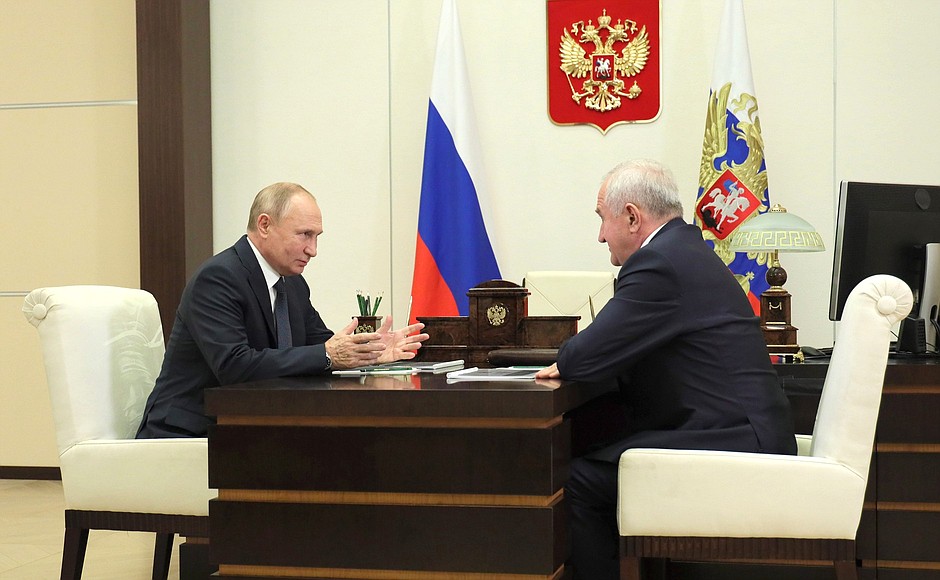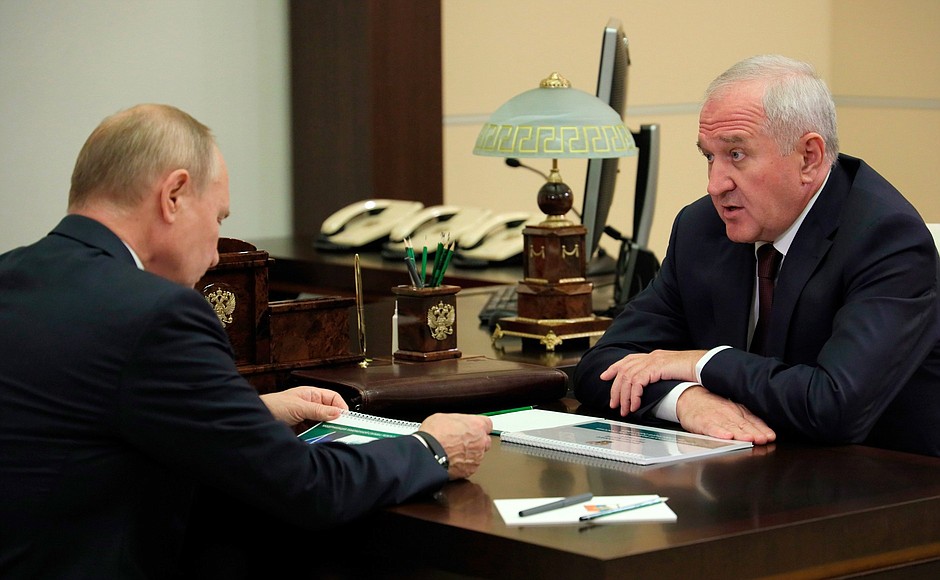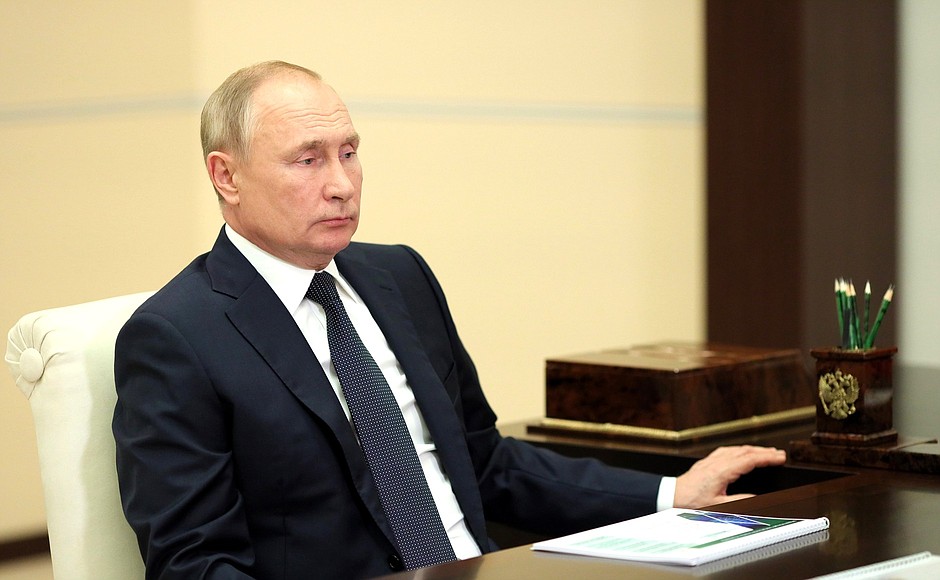President of Russia Vladimir Putin: I know that you wanted to start our today’s meeting by discussing transformations and how the reform of our Customs Service is proceeding.
Please, let us begin.
Head of the Federal Customs Service Vladimir Bulavin: Mr President, a year ago, I already reported to you that, in 2020, we had implemented sweeping transformations and a large-scale reform of the customs administration system. The reform was conducted under your decision and was accompanied by a substantial restructuring of customs agencies and an in-depth digital transformation of the customs process. We established online customs declaration centres, a chain of distributed centres – a total of 16 facilities, online customs offices, and the customs offices have been converted into customs facilities and monitoring posts.
As it happens, 2021, on the one hand, marks the 30th anniversary of the establishment of the Federal Customs Service, and on the other hand, this is the first year that the Federal Customs Service has virtually worked within a system of new coordinates.
Although the year is not over yet, it is possible to sum up certain results.
See also
In our opinion, the main principles of the reform that have been implemented have proved their worth. Most importantly, we have managed to accomplish two main tasks: Customs clearance has become faster, more transparent and more convenient for foreign economic operators, and the administrative burden on businesses has been reduced considerably. On the other hand, customs clearance has become more cost-effective for the state in the context of fulfilling customs agencies’ fiscal function. In the long run, we believe that all this has helped expand nationwide trade volumes.
I would like to dwell briefly on all these matters.
We managed to digitise almost all customs procedures during the reform. For example, our information systems process 860 million entries daily. It takes five seconds to write off customs payments from a single personal account, four seconds for the risk management system to check for customs risks, one second to send a request for data to the digital archive, and about 30 seconds to send request to another federal executive body for information that we need for customs clearance. This made it possible to automate individual customs clearance procedures.
This year, we have issued four million declarations in nine months, of which 3.2 million declarations were automatically entered into the system and slightly over one million were automatically issued. One electronic declaration is automatically issued in four minutes without any human input, which means quickly, efficiently and objectively.
In general, for risk-free supplies, it takes on average one hour and ten minutes that is, 70 minutes, to issue an electronic import declaration, and 36 minutes to issue an export declaration. Almost 80 percent of all declarations are issued within four hours, which is what the EAEU Customs Code specifies.
We believe this has had a significant impact on our relations with business entities. Almost 100 percent of the declarations are submitted online. All other contacts with the participants in foreign economic activity are maintained using the Personal Account of a Participant in Foreign Economic Activity service which can be used to submit a declaration online, make the necessary customs payments, check the status of current accounts, and submit the necessary documents, if requested. To reiterate, we have achieved our goal of making the customs clearance process faster, more efficient and user friendly.
And second, of course, it must be said that the customs procedure has become more effective for the state. This year we have transferred 4.8 trillion rubles to the federal budget over nine months. The forecast task has been exceeded by 133 percent: we have transferred 1.2 trillion more to the budget than the forecast task that we had.
It is generally accepted that customs payments are mainly export payments. The results of nine months of our work show that two-thirds are payments for imports and one-third for exports, that is, we have transferred 3.2 trillion in import and 1.6 trillion in export payments.
It should be noted that overall, this year the Russian Federation’s trade grew 35 percent compared with the first nine months of last year and amounted to US$540 billion. Our exports amount to US$310 billion and imports to US$230 billion, which means we have a generally positive balance. Of course, these volumes have different elements: the growth in value of both imports and exports or payments introduced for the supply of grain and timber; but at the same time, we believe that there is also such an element as the efficiency of customs clearance at the electronic declaration centres. We are handling the increasing bulk of trade quite well.
I would like to note our cooperation with the railway. This year we have moved our joint work online, which means that now we have ensured that electronic documents are provided once and the zero VAT for exporters is confirmed online, which has had a significant impact on the movement of goods along the railway. In general, their volumes have grown almost 1.5 times.
Transit on our railways has also grown significantly. The railway has a profit of about 50 billion rubles from transit alone. This year, the container traffic will amount to more than one million containers, and this will also entail a total effect of about 60 billion rubles according to the data the railway has.
This means we believe that the reforms we have carried have reached their goal: we have largely facilitated and sped up the customs procedures and made the customs process more business-friendly, without losing control over customs. The customs procedure is quite effective for protecting the interests of the state.
Vladimir Putin: How much are you going to contribute to the budget this year?
Vladimir Bulavin: For nine months, we exceeded our targets by 1.2 trillion. If the estimates are not revised upwards in the near future, I think we might exceed this figure. It is hard to make predictions right now.
Vladimir Putin: The Government will hear you and make adjustments.
You have an extensive programme for upgrading checkpoints. How is it progressing, besides the electronic platforms?
Vladimir Bulavin: Mr President, we are actively working with the Ministry of Transport on this, and the creation of an intelligent checkpoint is one of our joint projects – this project is included in the Customs Service Development Strategy to 2030. That is, we are developing a conceptual scheme for an intelligent checkpoint and creating a digital platform that will be used by the oversight bodies working at the checkpoints. According to our plan, this will ensure non-stop movement of goods for risk-free deliveries of consignments.
I would also like to note that we are now working on creating a project for digital analysis of the images made by customs inspection complexes. We are using artificial intelligence in the customs service, since our product range includes 12,500 items, and the computer must first be taught to identify each particular consignment so that it commits them to memory so as to be able to analyse images it receives from customs inspection complexes without supervision.
In addition, our joint plan with the Ministry of Transport includes equipping the checkpoint with streaming customs inspection complexes, which will scan incoming vehicles without their drivers needing to leave them. At present, it takes about six minutes to scan a vehicle. Currently, a vehicle must first stop and the driver, in order to avoid radiation, must get out, and then the vehicle gets scanned (there are two options: either the frame goes around it, or a vehicle gets pulled through the frame), and this takes about six minutes, or 10 vehicles per hour. If we continue to work like this, clearly, we will not be able to scan more than 240 vehicles [per day]. During the summer, when the workload is heavy, 500 or even more vehicles pass through our checkpoints.
Vladimir Putin: I see.
What areas require special attention?
Vladimir Bulavin: We are aware of these checkpoints. Currently, they include Burachki, European direction, and the Pskov Region where the checkpoint is being renovated. Upper Lars in Georgia is always a problem. This year, this checkpoint was closed for about 90 days due to bad weather with snow drifts and avalanches. Lower Zaramag in Azerbaijan is also being renovated. All three checkpoints are under renovation.
Vladimir Putin: Good. Thank you.
<…>


